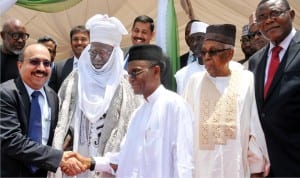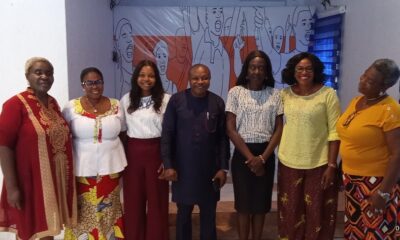Business
Nigeria’s Telecoms Investment Profile Hits $32bn

L-R: Managing Director, African and Middle East Olam International, Mr Venkataramani Strivathsan, Sir Gbagyi, Chief Danjuma Barde, Governor Nasir El-Rufai of Kaduna State, former Chairman, Scoa Motors, Alhaji Ahmed Joda and representative of Minister of Agriculture and Rural Development, Mr Obina Okpara, at the groundbreaking of the Animal Feed and Protein Company in Kaduna, last Friday.
The Nigerian Communications Commission (NCC) says about 32 billion dollars has been invested in the nation’s telecommunications industry from Foreign Direct Investment (FDI) and local investors.
The Executive Vice-Chairman of the commission, Prof. Umar Danbatta, disclosed this in Lagos at a forum organised by the Association of Telecommunications Companies of Nigeria (ATCON).
Danbatta, who gave a keynote address entitled: “State of the Industry, A Regulator’s Perspective”, recalled that before 2001, few people had access to telephone and the Internet.
He said only about 500,000 lines were available for a population of 90 milliaon people in Nigeria before the advent of Global System for Mobile Communications (GSM).
It would be recalled that former President Olusegun Obasanjo’s administration had in 2001 inaugurated GSM with the licensing of Econet and MTN.
Danbatta said Internet connectivity was abysmal, while investors were reluctant to come to Nigeria.
“However, the Digital Mobile License auction of 2001 changed the story.
“Since then, over $32 billion has been invested in telecommunications industry, both from Foreign Direct Investment (FDI) and local investors.
“With over 152 million active telephone lines and nearly 97 million connections to the internet, Nigeria now has 107 per cent teledensity.
“Growth of the sector is followed by massive job creation whereby several millions of Nigerians and expatriates have been gainfully employed directly and indirectly by the operators.
“Even companies and Value Added Service (VAS) providers, among others also employed.
“Indeed by the International Telecommunication Union’s (ITU) estimation, Nigeria’s telecommunications industry remained the fastest growing in the world for more than five years, so much that it is still investors’ preferred destination,” he said.
Danbatta noted that people also had access to the Internet through their smart devices and banking had been made much easier because of telecommunications.
He added that people could now do banking transactions from their homes, offices and smart devices.
The NCC chief said: “Electronic commerce now boomed; as people can access to shop online from the comfort of their homes, offices and the smart devices.”
The executive vice-chairman noted that online shops like Konga, Deal Dey, Jumia, Yudala were more common place for those who wanted to shop from home.
“Jovago had been well known for hotel booking and general hospitality. “ The online shops, the banking sector among others are all powered by Information and Communication Technology (ICT).
“I want to state clearly that we have done very well considering where we are coming from, despite some bottlenecks that are recurrent.
Business
MWUN Backs Nigeria’s Bid For IMO’s Category C Seat
Business
Food Security: FG To Review Nigerian Agric laws
Business
Okpebholo Charges Committee To End Herders, Farmers Clash In Edo … Inaugurates Boundary Committee
-
Rivers3 days ago
Okrika SOLAD Charges Students On Involvement In Drugs, Others
-
Rivers3 days ago
Rivers State University Introduces SponsorsLink To Address Communication Gap
-
News3 days ago
FG Restates Commitment To Improve Rural Roads, Markets, Others
-

 Politics3 days ago
Politics3 days agoINEC Denies Registering New Political Parties
-
Sports3 days ago
Ekiti Honour Contingents On National AGILE Games’ Feats
-

 Nation3 days ago
Nation3 days agoNGOs Urge RSG To Prioritise Child Protection Funding
-
Politics3 days ago
LG Autonomy: ICPC Hails S’Court Decision, Decries Councils’ Funds Misuse
-

 Editorial3 days ago
Editorial3 days agoResponding To Herders’ Threat In Rivers

